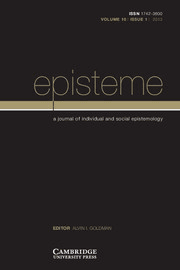
Episteme-A Journal of Individual and Social Epistemology
Scope & Guideline
Exploring the Depths of Knowledge and Society
Introduction
Aims and Scopes
- Social Epistemology:
The journal emphasizes the study of knowledge in social contexts, addressing how social dynamics influence belief systems, trust, and the dissemination of information. - Epistemic Injustice:
A core area of focus is on epistemic injustice, exploring how power dynamics affect knowledge production and the recognition of marginalized voices in epistemic discussions. - Normative Epistemology:
The journal examines normative questions surrounding belief, justification, and knowledge, often questioning the validity of traditional epistemic norms in light of contemporary issues. - Expertise and Trust:
There is a significant focus on the role of expertise in society, investigating how trust is established and maintained in expert communities, particularly in the face of misinformation. - Technological Impact on Epistemology:
The journal critically engages with the implications of technology on knowledge acquisition and dissemination, including the effects of social media and artificial intelligence on public discourse. - Cognitive and Behavioral Aspects of Epistemology:
Research often integrates insights from psychology and cognitive science to explore how cognitive biases and social behaviors influence epistemic practices.
Trending and Emerging
- Impact of Misinformation and Trust:
There is a growing emphasis on the study of misinformation, particularly in the context of social media, and its implications for public trust in expertise and institutions. - Epistemic Virtues and Responsibilities:
Recent publications highlight the importance of epistemic virtues, such as intellectual humility and social inquisitiveness, as essential components of responsible knowledge production and dissemination. - AI and Epistemic Practices:
The intersection of artificial intelligence and epistemology is gaining traction, with research exploring how AI affects knowledge creation, authority, and accountability in epistemic practices. - Collective Epistemic Agency:
Emerging discussions focus on collective epistemic agency, examining how groups navigate knowledge creation and the implications of group dynamics for epistemic justice. - Dialogical and Plural Approaches to Epistemology:
There is an increasing trend towards dialogical approaches in epistemology, emphasizing the importance of diverse perspectives and collaborative inquiry in addressing epistemic issues.
Declining or Waning
- Traditional Epistemic Theories:
There appears to be a waning interest in classical epistemic theories, such as foundationalism and coherentism, as newer perspectives and methodologies gain prominence. - Metaphysical Foundations of Knowledge:
Topics that delve deeply into the metaphysical underpinnings of knowledge, such as discussions on the nature of propositions and abstract objects, have become less frequent. - Historical Epistemology:
Research focusing on historical perspectives of epistemology, including the works of classical philosophers, is less prevalent, indicating a shift towards more contemporary issues. - Purely Theoretical Epistemology:
There is a noticeable decline in papers that deal solely with theoretical constructs without practical application, as the journal increasingly favors applied epistemology. - Debates on Epistemic Norms without Contextual Relevance:
Discussions centered on epistemic norms that lack contextual grounding or relevance to current societal issues are becoming less common.
Similar Journals

JOURNAL OF PHILOSOPHY
Elevating scholarly dialogue in the realm of philosophy.The Journal of Philosophy, with ISSN 0022-362X and E-ISSN 1939-8549, is a premier academic publication in the field of philosophy, published by J Philosophy Inc. Located in the United States at Columbia University, 709 Philosophy Hall, New York, NY 10027, this esteemed journal serves as a critical platform for rigorous scholarly discourse and innovative research. With a commendable Impact Factor and ranked in the top Q1 category for Philosophy in 2023, the journal holds a prominent position within the academic community, attracting contributions that push the boundaries of philosophical inquiry. The Journal of Philosophy has consistently ranked in the 91st percentile in the Scopus Arts and Humanities rankings (Rank #65/806), underscoring its influence and the relevance of its published works. Though it operates on a subscription model, the journal’s extensive back-catalog and current issues provide invaluable resources for researchers, professionals, and students alike, promoting a deeper understanding of philosophical concepts and stimulating meaningful discussions in contemporary thought.
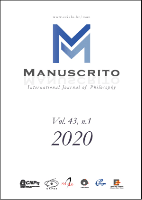
Manuscrito
Exploring the Frontiers of Philosophical ThoughtManuscrito is a prominent open access journal published by UNICAMP-UNIV ESTADUAL CAMPINAS, dedicated to exploring critical themes in the realm of Philosophy. With an ISSN of 0100-6045 and E-ISSN 2317-630X, it has been advancing academic discourse since its inception, transitioning to an open access model in 2011 to enhance the dissemination of knowledge. Strategically located in Campinas, Brazil, the journal's editorial focus spans a diverse array of philosophical inquiries, engaging scholars from various perspectives. The journal holds a respectable Q3 ranking in the 2023 category of Arts and Humanities - Philosophy in Scopus, ranking #503 out of 806 journals, placing it within the 37th percentile. The Manuscrito journal is committed to fostering intellectual exchange and encouraging research that challenges traditional paradigms. Researchers, professionals, and students will find it an invaluable resource for accessing pioneering ideas and contemporary philosophical debates, especially as it is poised to converge on new insights from 2017 to 2024.

SYNTHESE
Fostering innovative thought for a complex world.SYNTHESE is a prestigious academic journal published by Springer, renowned for its contributions to the fields of Philosophy and Social Sciences. With a distinguished history dating back to its inception in 1936, this journal continues to thrive, offering a platform for innovative and critical discourse. Recognized for its excellence, SYNTHESE holds a remarkable Q1 quartile ranking in both Philosophy and Social Sciences (miscellaneous) as of 2023, placing it within the top tier of scholarly publications. Its impressive Scopus rankings further underscore its influence, boasting a rank of #48 out of 806 in Philosophy and #70 out of 275 in General Social Sciences, thereby reflecting a 94th percentile in the arts and humanities. The journal's scope encompasses a wide array of interdisciplinary and philosophical inquiries, making it a vital resource for researchers, professionals, and students seeking to deepen their understanding of complex social issues. With access options that promote scholarly connectivity, SYNTHESE is committed to advancing knowledge and fostering intellectual engagement within the global academic community.

Etudes Episteme
Exploring the Frontiers of Knowledge and ThoughtEtudes Episteme is a prominent peer-reviewed journal published by Institut Monde Anglophone, specializing in the interdisciplinary study of epistemology and the philosophy of knowledge. Since its inception in 2002, the journal has embraced an Open Access model, enhancing accessibility and encouraging global discourse among researchers, professionals, and students in the field. With its ISSN 1634-0450, this publication not only contributes significantly to academic scholarship but also serves as an essential resource for understanding the complexities of knowledge production and dissemination. The journal's commitment to high scholarly standards ensures that it remains a vital platform for innovative research and critical analysis, fostering a deeper understanding of epistemological issues in contemporary society. Based in Paris, France, Etudes Episteme invites contributions that challenge the boundaries of conventional thinking and stimulate intellectual engagement across various disciplines.

Epistemology & Philosophy of Science-Epistemologiya i Filosofiya Nauki
Exploring the Intersections of Philosophy and ScienceEpistemology & Philosophy of Science-Epistemologiya i Filosofiya Nauki is a prestigious journal published by the Russian Academy of Sciences - Institute of Philosophy, dedicated to advancing the discourse in the fields of epistemology, philosophy of science, and related disciplines. With a distinguished presence in academia, this journal is recognized for its exceptional contributions, evident through its categorization as a Q2 journal in Arts and Humanities and Philosophy, and a Q1 journal in Cultural Studies. Covering an expansive scope from 2017 to 2023, it facilitates a vital dialogue among scholars and professionals aiming to explore the intersections of knowledge, culture, and education. Although currently not open access, the rigorous peer-review process ensures that only high-quality research is published, enriching the intellectual landscape. The journal's commendable rankings in Scopus, particularly in Arts and Humanities and History and Philosophy of Science, reflect its commitment to scholarly excellence. For researchers, educators, and students, Epistemology & Philosophy of Science serves as an essential resource for understanding and contributing to the ongoing philosophical dialogues that shape our comprehension of scientific inquiry.
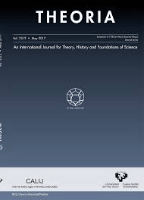
THEORIA-REVISTA DE TEORIA HISTORIA Y FUNDAMENTOS DE LA CIENCIA
Advancing the Dialogue on Science and HistoryTHEORIA-REVISTA DE TEORIA HISTORIA Y FUNDAMENTOS DE LA CIENCIA, published by the Servicio Editorial Universidad del País Vasco, is a leading open access journal dedicated to advancing the fields of History, Philosophy of Science, and related disciplines since its inception in 2003. With a robust impact factor placing it in the esteemed Q1 and Q2 quartiles in its respective categories, this journal serves as a crucial platform for researchers, professionals, and students who are engaged in profound discussions and analyses of scientific foundations and historical contexts. Based in Spain, THEORIA has consistently demonstrated its commitment to scholarly excellence, achieving notable rankings in Scopus, particularly in the fields of Arts and Humanities, where it holds a rank of #169 in Philosophy and #59 in History and Philosophy of Science. The journal not only allows immediate open access to its diverse range of articles, fostering global knowledge dissemination, but also aims to bridge connections across varied philosophical inquiries and historical explorations within science. Join the dialogue today in shaping the future understanding of our scientific heritage.

Organon F
Empowering dialogue through innovative philosophical inquiry.Organon F is a distinguished open-access journal dedicated to the advancement of philosophical discourse and inquiry. Published collaboratively by the Institute of Philosophy of the Slovak Academy of Sciences and the Institute of Philosophy of the Czech Academy of Sciences, this journal promotes innovative and critical approaches to a wide range of philosophical topics. With its establishment in 2002 and continuous commitment to academic rigor, Organon F has rapidly ascended through the ranks, currently holding a Q2 classification in the field of Philosophy according to the Scopus database, ranking 279 out of 806 journals with a commendable 65th percentile standing. The journal is pivotal in fostering interdisciplinary dialogue and serving as a reliable source of scholarly research, making it an essential resource for researchers, professionals, and students alike. Its open-access format since 2010 ensures that cutting-edge philosophical insights are readily available to a global audience, empowering the academic community to engage with and contribute to ongoing debates in contemporary philosophy.
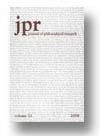
Journal of Philosophical Research
Fostering Insightful Dialogue in PhilosophyThe Journal of Philosophical Research, published by the PHILOSOPHY DOCUMENTATION CENTER, stands as a significant conduit for scholarly dialogue in the field of philosophy. With the ISSN 1053-8364 and E-ISSN 2153-7984, this journal has been instrumental in fostering academic discourse from its inception in 2002. Although not open access, it maintains a robust reputation, evidenced by its Q3 ranking in the philosophy category for 2023 and a commendable position in the Scopus Ranks (Rank #287 out of 806) reflecting the journal's impact factor in the arts and humanities. The journal's rigorous selection process ensures the publication of high-quality, peer-reviewed articles covering a broad spectrum of philosophical inquiries, making it an essential resource for researchers, professionals, and students alike. Situated in Charlottesville, Virginia, it exemplifies the commitment to advancing philosophical understanding and scholarship, while serving as a valuable repository of contemporary philosophical thought.
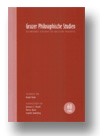
Grazer Philosophische Studien-International Journal for Analytic Philosophy
Challenging Conventional Paradigms Through Rigorous AnalysisGrazer Philosophische Studien - International Journal for Analytic Philosophy, published by BRILL, stands as a pivotal academic outlet in the realm of analytic philosophy. With an esteemed Q1 ranking in the philosophy category for 2023, it reflects high scholarly standards and substantial impact, ranking 161st out of 806 journals in the field. The journal, bearing the ISSN 0165-9227 and E-ISSN 1875-6735, caters to a diverse audience of researchers, professionals, and students, providing a platform for the dissemination of innovative philosophical thought. As it converges its publications from 2011 to 2013 and continues robustly from 2015 to 2024, the journal emphasizes interdisciplinary approaches and encourages contributions that challenge conventional paradigms. Although it currently does not operate under open access, its scholarly articles are crucial for advancing discourse in analytic philosophy, making it an indispensable resource for anyone engaged in rigorous philosophical inquiry.

International Journal for the Study of Skepticism
Advancing Critical Thought on SkepticismThe International Journal for the Study of Skepticism is a leading academic periodical published by BRILL in the Netherlands, dedicated to advancing the field of philosophical skepticism. With an ISSN of 2210-5697 and an E-ISSN of 2210-5700, this journal is recognized for its rigorous scholarship and critical discourse, holding a prestigious Q2 ranking in Philosophy as of 2023, and boasting a Scopus ranking of 373 out of 806 in the Arts and Humanities category, placing it in the 53rd percentile. As a pivotal platform for researchers and thinkers, the journal aims to explore the nuanced implications of skepticism across various facets of philosophy, inviting contributions that challenge traditional paradigms and foster interdisciplinary dialogue. Although it does not currently offer open access, the journal remains essential reading for scholars interested in the contemporary debates surrounding skepticism and its historical development. Located at PLANTIJNSTRAAT 2, P O BOX 9000, 2300 PA LEIDEN, NETHERLANDS, this journal not only serves as a repository of innovative thought but also as a beacon for future research in skepticism through its converged years from 2011 to 2024.